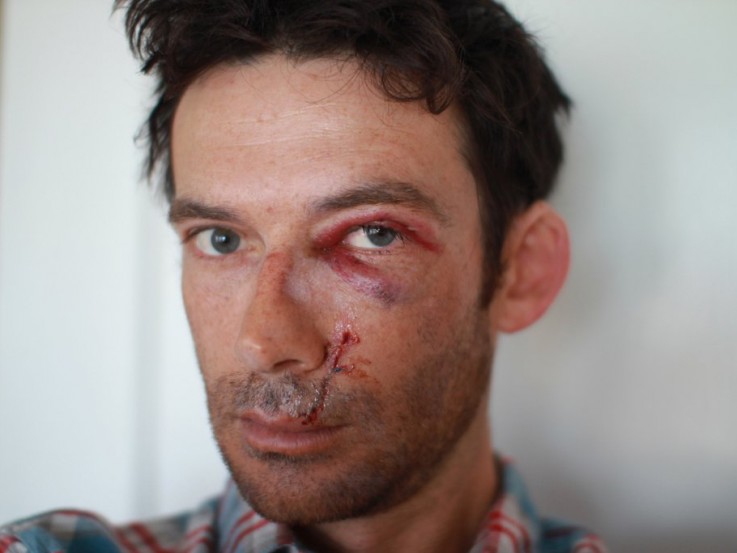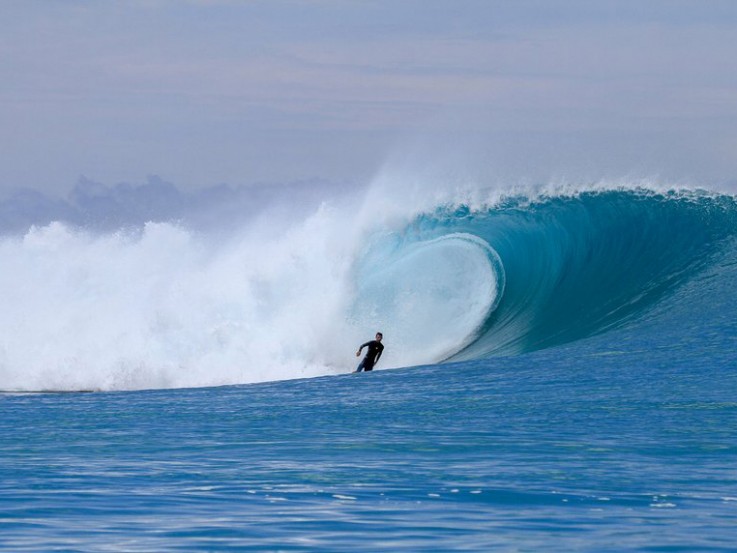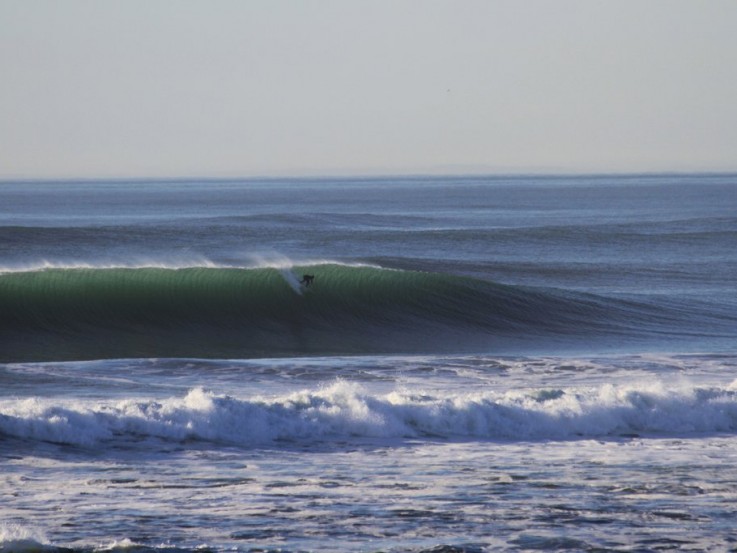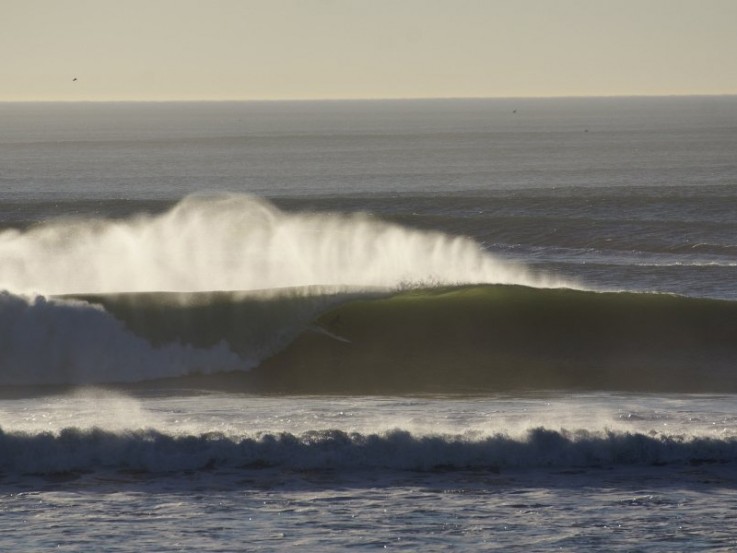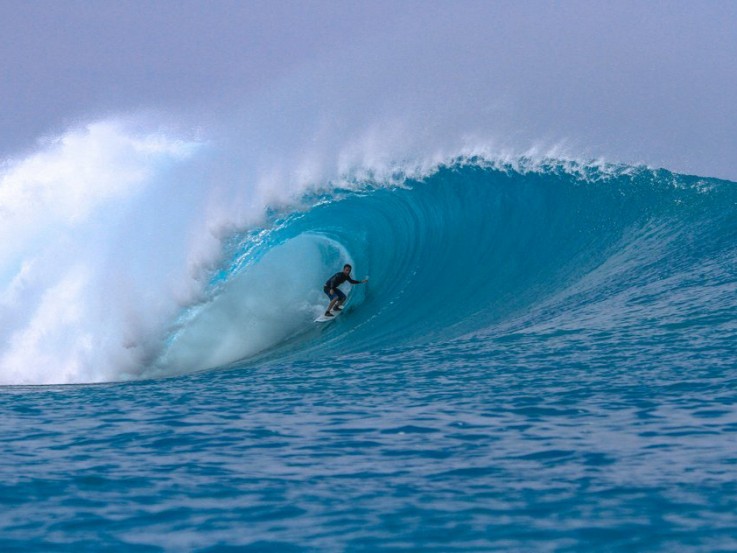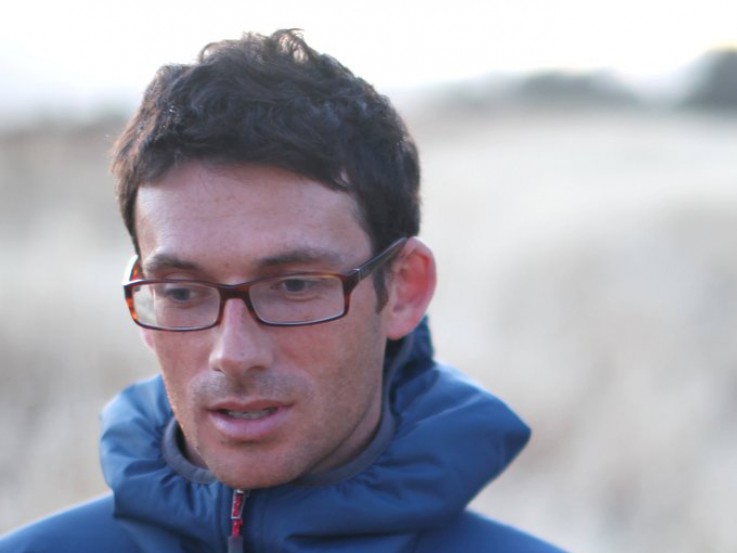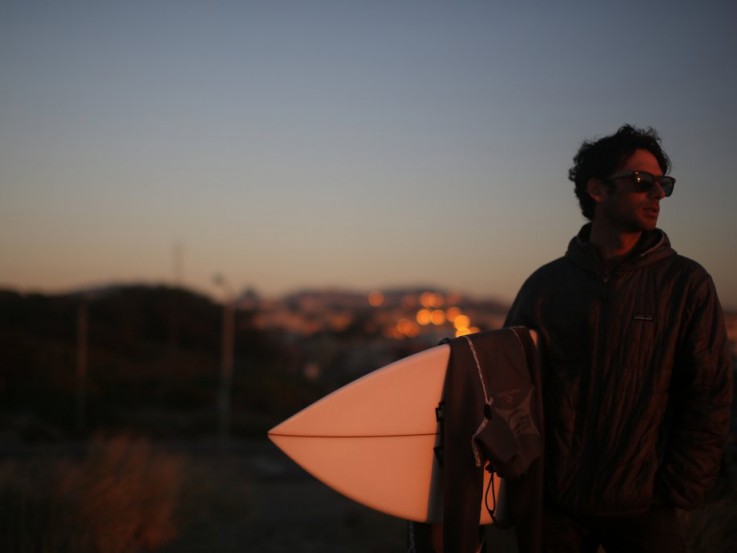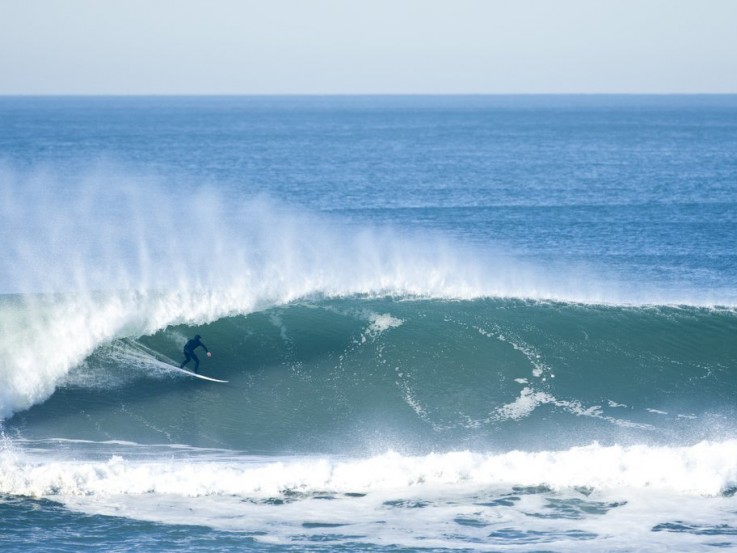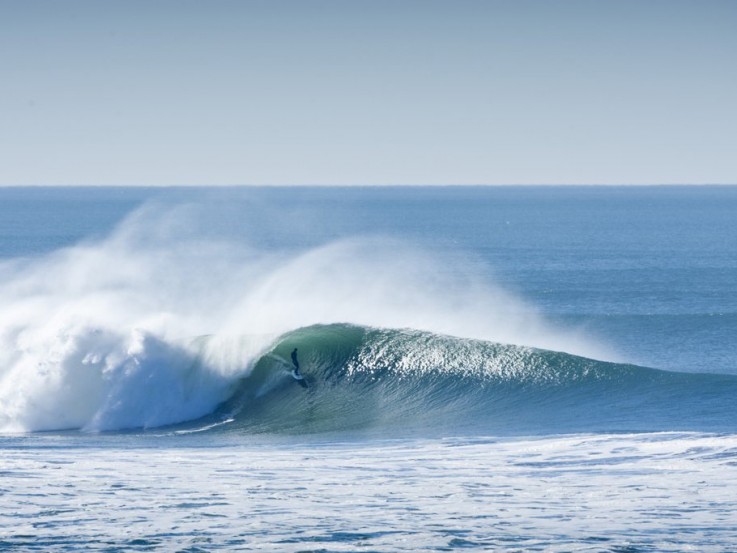Lewis Samuels - Writer
When and where did you first start surfing?
I grew up in a tiny coastal town about an hour north of San Francisco. I was one of those kids that's always obsessed with something, and around 7 my obsession switched from Star Wars to surfing. This was in the mid-eighties. I did the sand crab thing, out in the water all day, no wetsuit, just freezing. Northern California's coastline is fairly cold and inhospitable - 4/3, booties, and hood even in summer usually. I didn't have a surfboard but sometimes I could borrow one from someone and I'd go stand up in the whitewater.
Around 7th grade, I got a wetsuit and my older friend gave me his old single-fin. All my friends had quit doing the beach thing by 10 or 11 to smoke pot and hang out with girls and stuff. So I was pretty much the only local kid surfing for a little while. I surfed with the older guys - hardcore surfers in their 40's and 50's. Guys who were tree workers and carpenters and dope growers. I'd drive up the coast with them in beat old trucks and try to learn from them. It's so goddamned fickle and brutal and punishing at the exposed spots in Norcal - it used to take a lot of knowledge to be at the right place at the right time. We surfed a lot of big days alone and got worked a lot. And all of that really effected my surfing - riding single fins, learning by watching these smooth older surfers who rode handmade boards in big waves, put their lives on the line at sharky spots no one surfed often, before surf schools, before digital cameras, before surf reports, before the internet.
10 or 11 is pretty early to be smoking pot!! What kept you from going down that path and keep on surfing?
Surfing didn't keep me sober, but the onshore winds often come up early in Northern California, and that kept me from partying too hard in my teens. I lived in constant fear of "missing it" and I still do, to a certain extent. But that's one of the things I love about surfing - every day is different, and some days are epic. If you keep at it, you're going to find those clear, euphoric moments. As a kid, that made the small town I lived in suddenly feel as vast and mysterious as the ocean that buttressed it. And in that time and place, surfing still felt like a non-conformist act; a way to register your dissent in regards to adult life. So that Holden Caulfield thing appeals to kids of all ages - the idea that there's more to life than a desk job, mortgage, and being a phony.
When did you move away from Norcal? What was the impetus?
When I was 18 I went to college at University of California San Diego. It was a pretty big culture shift. In SoCal, surfing was mainstream, and every party and bar had a Taylor Steele movie playing on repeat. Every conversation revolved around surfing, and I got to meet people in the surf industry who actually made their money off of surfing. On one level, it was really fun to immerse myself in that world, and hang out with other kids who loved surfing as much as I did. But the ubiquity of surfing in SoCal eroded much of its charm. I felt like my identity and belief system had been co-opted by tanned salesmen; whored out as another pitch to sell people crap they don't need. I was surrounded by self-proclaimed surfers, and they all knew about Kelly Slater and Quiksilver, yet I felt like most of them didn't understand a thing about the actual act of surfing. I've always been pretty cynical about the commercialization of surfing, and the people who work surf industry jobs, and those years in SoCal cemented my perspective. I left San Diego the day I graduated and I've lived in Northern California ever since. But now San Francisco has pockets of surf culture that are just as commercial and over-crowded as San Diego was back then. And I've since cashed my fair share of checks from surf magazines, and gotten my fair share of shit for being just another sell-out. But I've always had one foot firmly planted in another world, outside of surfing - a second career, friends and interests that have nothing to do with surfing.
What is your second career? And what are your interests that have nothing to do with surfing?
I've never really made a living writing about surfing. It's a tough thing to do, unless you're sleeping on couches, or still living at home, or supported by a more financially successful spouse. Instead, the money has always come from I've doing user research in the tech industry. It's a bit like being an anthropologist, except instead of studying a remote tribe in the amazon, I research how normal people utilize technology. I work with design teams to make apps and websites more useful and easier to use. Most recently, I've been at Google and Twitter.
There's plenty of irony there, as many of the local surfers in San Francisco reasonably blame companies like Google and Twitter for destroying the "old" San Francisco - the idea of a city where you could live cheaply enough to be an artist, musician, social worker, activist, or writer. But the cost of housing is astronomical now, and the beach neighborhoods that were once maligned are now enclaves for high-paid tech workers who dabble in surfing. You can't beat 'em, and I have a family to support, so I've chosen to join them. Yet another reason I could be called a sell out. But there's a long, venerable tradition of surfers doing what they have to do to make some coin and keep surfing, from Miki Dora's cons to the drug-smugglers who started our industry's celebrated surf brands. If there are any pure-hearted surfers out there, you don't hear much about them.
What is it that you love about surfing?
I've devoted so much of my life to surfing, from the age of seven onwards, that I don't think about surfing in that way. Asking me what I love about surfing is a bit like asking what you love about breathing, or sex. There's just instinct, and a ceaseless drive to keep doing it. I don't spend much time thinking about why, or what. But seeing good waves - particularly big, empty, left barrels - still gets me excited in that little kid way, and there's very little else in life that elicits that kind of primal response, for me.
But there's a toll, and a lot of sacrifices go along with that level of commitment. So I spend more time thinking about that than I do about what I love about surfing.
The Power Rankings series you wrote on Surfline seemed to ruffle a few feathers, do you think that were you a bit harsh on some of the guys or were some just too thinned skinned?
Yes I've been harsh, and yes some pro surfers have been too thin skinned. But professional sport can't exist in a vacuum. There needs to be an audience, otherwise no one gets paid. So professional surfers are entertainers, at the end of the day. If you choose a career that depends upon an audience, you have to expect criticism. That holds true for writers just as much as surfers. When I write about professional surfing, I want to engage with the audience, and make them engage with the sport by having strong opinions. That's how sport flourishes. Fans have to love some teams and athletes, which usually means hating the teams or athletes they compete against. If you don't care one way or the other, what's the point of watching? And the same goes for my writing. If I don't care, and the readers don't care, what's the point of me writing something, or the audience reading it? So whether people agree with me or disagree, love what I write or hate it, at least I want them to feel something.
How did the short-lived ASP (WSL) Power Rankings come about and end?
Some suits from the ASP contacted me and pitched the whole idea. I was a bit perplexed from the beginning, and kept asking them if they were really sure they understood what they were getting into, and they thought they did. I guess they wanted to bring some passion and controversy into the sport? Anyway, it all turned out pretty much like you'd expect. They never filled me in on the details, but I suppose someone important had their feelings hurt and complained to the powers that be. They pulled the power rankings down about a day after they'd put them up. I reckon it's pretty rare to get hired for and fired from the same job so many times. On that note, Surfline asked me to do the Power Rankings again at the end of last year, and I figured what the hell - why not? If nothing else, the irony appeals to me.
Are the Surfline Power Rankings going to be a regular feature throughout the year?
Surfline has been having other guys write them ever since I stopped doing it for them. I assume that's the plan for this year too, but I haven't talked about it with them.
Do you have any other surf related projects in the works?
Just the usual stream of magazine articles, which get attention as deadlines loom. I wish I had the space to take on more of the projects people pitch to me, let alone dream up my own. But the time isn't there. If I'd found an audience when I was in my 20s, I could have banged out words by the 1000s - books, long-form articles, whatever. These days I have to be pretty selective about what I take on.
What is it that you love about your work?
I love being able to focus on surfing without all the usual guilt associated with any obsession with an inherently selfish, hedonistic act of dubious overall value. Making surfing your work has the potential to tarnish the act, but it also allows you to really dig in and give it the kind of attention most responsible adults reserve for their careers or helping others.
Any advice to up and coming surf writers?
My advice to any aspiring surf writer would be to do it only if you love doing it, and have a back up plan. You might end up with some good stories to tell, but you won't get rich, quickly or slowly. Find your own voice, be passionate about your subject matter, and avoid cliche.
Where can we find you online?
| Twitter: | twitter.com/postsurf |
| Instagram: | instagram.com/lewissamuels |
Posted by: Troy Roennfeldt, on February 23, 2015
Categories: Interviews
Latest Posts
Craig Sims - White Horses & Surfing Life Publisher
Luke Kennedy - Editor of Tracks Magazine
Simon ‘Swilly’ Williams - Surf Photographer
Jarra Campbell - the Bondi Alchemist
Greg Gordon - Owner of CR Surf
Shayne Nienaber - Surf Photographer
Alexa Hohenberg - Owner of Still Stoked
Christine Deveney - TapaReef Owner & Creator
Russell Ord - Surf Photographer
Richard Kotch - Surf Photographer
Categories
Interviews
Articles
Videos
Press Releases
Quiz
Archive
December 2018
November 2018
October 2018
September 2018
August 2018
July 2018
June 2018
May 2018
April 2018
March 2018
February 2018
January 2018
November 2017
January 2017
December 2016
November 2016
October 2016
September 2016
August 2016
July 2016
June 2016
May 2016
April 2016
March 2016
February 2016
January 2016
December 2015
November 2015
October 2015
September 2015
August 2015
July 2015
June 2015
May 2015
April 2015
March 2015
February 2015
January 2015
December 2014
November 2014
October 2014
September 2014
August 2014
July 2014
June 2014
May 2014
April 2014
March 2014
February 2014
January 2014
December 2013
November 2013
October 2013
September 2013
August 2013
July 2013
June 2013
May 2013
April 2013
March 2013

